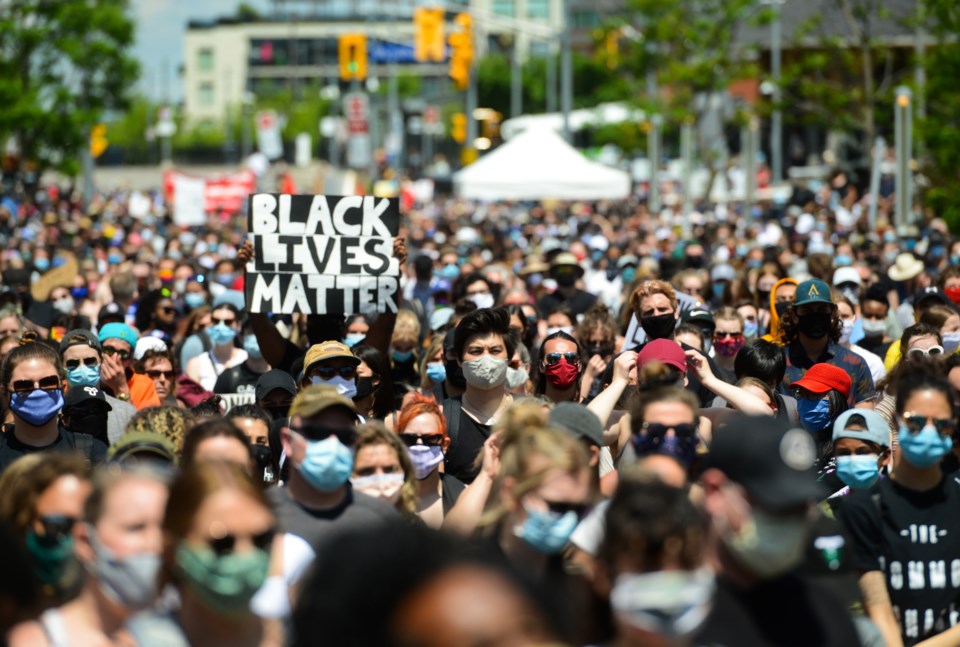I have been to a lot of political protests and rallies in Guelph, and I have seen nothing like the turnout for the Solidarity March for Black Lives Matter downtown last weekend.
Spending the day at a protest is one thing but maintaining that desire for change by chasing specific policy goals is another. It was only a matter of time before people start looking to a solution that’s come up in many conversations since George Floyd died almost three weeks ago: defund the police.
What does that mean for Guelph?
First, let’s be clear that there is no one set of ideals or policy behind the phrase, “defund the police.” What it doesn’t mean is creating a land of do-as-you-please where we’re all on the honour system. What it does mean is that we should not take requests for increases to the police budget as a fait accompli.
It also means that we should rethink what counts as a job that requires the intervention of the police. Even the police officials themselves will admit that they are doing things outside of the original intent of a police force, things like responding to mental health calls, or dealing with overdoses.
It’s hard to believe that it was just six months ago that our city council approved a $4.1 million increase to the budget for the Guelph Police Service without much pushback. It was the single biggest increase to the overall Guelph budget in a year where all departments tried to keep increases to a bare minimum, and aside from debate about spreading out the cost, council accepted the justification for the increase.
Heck, the city itself accepted it. Scanning social media, you sensed widespread dissatisfaction with the police response to property crimes, dealing with the homeless and addicts downtown, and Guelph’s lost place as one of Canada’s safest communities. Without much protest, adding 30.5 full time equivalent positions seemed like the right call.
But Guelph has also lost ground in another series of metrics. Statistics Canada listed Guelph as one of 10 communities in Canada with highest percentage of hate crimes; in Guelph the number is 11.8 per cent while the national average is 5.7 per cent. If it seems weird that we’re upset about one set of stats, and not the other, then you might be on your way to understanding systemic racism.
Whether or not the 10 per cent increase to the police budget will help reduce the number of hate crimes in Guelph is hard to say, but it was not explicitly mentioned in the budget deliberations as a reason for the increase. Having said that, the people who would be directly helped by a reduction in the number of hate crimes were absent from the public deliberations of the budget at city council.
Perhaps part of the problem is that we’ve folded the police budget in with several other independently run city agencies like the library, and agencies we share jurisdiction with like public health and social services. The Local Boards and Shared Services Budget is then voted on as part of the entire tax-supported operating budget package, which makes the police service just another cog in the city machine like snow removal and traffic lights.
Another issue is that over the last 40 years in politics we’ve accepted wholeheartedly the idea that more police is always good.
In 1982, criminologist George Keeling wrote an Atlantic article where he coined the “broken window” analogy of crime fighting. The theory goes that by not addressing petty crimes in a neighbourhood, like never fixing a broken window of a building, it’s a sign that no one cares, and it leads to more disorder.
Keeling has been trying to undo the influence he unleashed in that Atlantic article for almost four decades by talking about how his theory has been misapplied. The theory was meant to inspire more community policing, more foot patrols, and more conversations between the police and the policed. But that’s not what happened. Instead the response to “broken windows” was about getting more charges, more convictions, and more policing that would more often than not target people of colour.
How do we change policing to better deal with the challenges they’re facing? How do we create a more egalitarian system where people of colour are not unfairly targeted? How do we encourage everyone to get involved, and open spaces for marginalized communities in Guelph to feel heard and engaged?
It begins with having an open conversation about these issues, and it also begins by not making policing just another thing the city does. It’s a service that comes with its own unique set of challenges and demands, and we should treat those separately from the rest.
I would encourage anyone interested in issues of policing to take part in a virtual town hall with police chief Gord Cobey with the Ward 2 city councillors on Saturday June 27 at 1:30 p.m.
